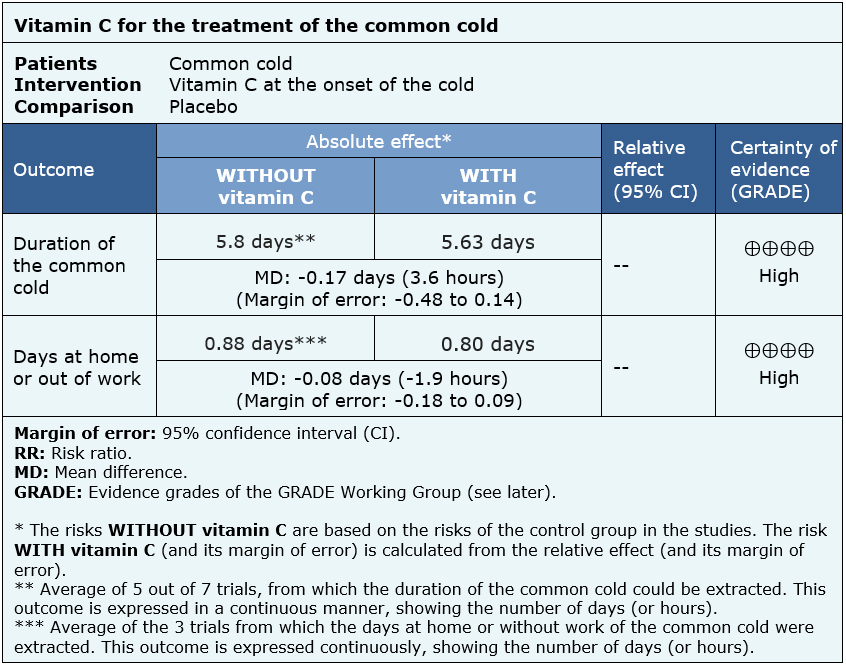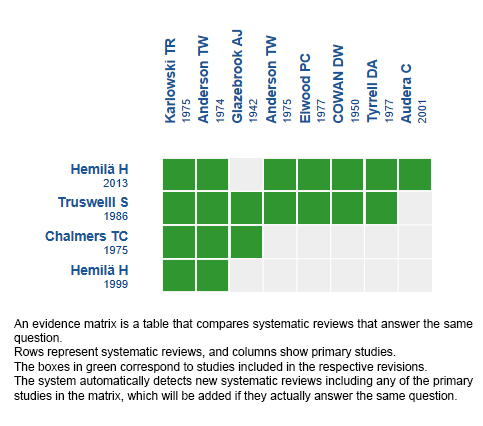Epistemonikos summaries
← vista completaPublished on October 3, 2018 | http://doi.org/10.5867/medwave.2018.06.7260
What are the effects of vitamin C on the duration and severity of the common cold?
¿Cuál es el efecto del tratamiento con vitamina C en la duración y severidad del resfrío común?
Abstract
INTRODUCTION The common cold causes great morbidity throughout the world and there are no effective therapeutic agents against it. There is a belief that consuming vitamin C during a cold episode would help reduce duration and severity of symptoms. However, there is controversy about this claim.
METHODS To answer this question we used Epistemonikos, the largest database of systematic reviews in health, which is maintained by screening multiple information sources, including MEDLINE, EMBASE, Cochrane, among others. We extracted data from the systematic reviews, reanalyzed data of primary studies, conducted a meta-analysis and generated a summary of findings table using the GRADE approach.
RESULTS AND CONCLUSIONS We identified four systematic reviews that included eight primary studies overall, of which seven were randomized trials. We concluded vitamin C has minimal or no impact on the duration of common cold or in the number of days at home or out of work.
Problem
The common cold is one of the most common diseases in the general population. The term ‘common cold’ does not refer to a specific condition, but to a group of symptoms such as nasal obstruction, sore throat, cough, lethargy and asthenia, with or without fever. These symptoms have multiple etiological agents such as rhinovirus, adenovirus, syncytial virus, among others. Despite the benign nature of this condition, it leads to substantial economic burden in terms of medical consultation, treatment, and work or school absenteeism [1].
Antibiotics have no role in the treatment of the common cold, even though they are widely prescribed and used. The development of a vaccine has been elusive since this condition is caused by multiple agents. Considering the prevalence of this disease, and the associated morbidity and costs, any intervention that can shorten the symptomatic period would constitute an important public health advance.
At the population level, it is widely believed that consuming vitamin C helps alleviate symptoms of the common cold. However, there is controversy about the scientific support to this belief.
Methods
To answer the question, we used Epistemonikos, the largest database of systematic reviews in health, which is maintained by screening multiple information sources, including MEDLINE, EMBASE, Cochrane, among others, to identify systematic reviews and their included primary studies. We extracted data from the identified reviews and reanalyzed data from primary studies included in those reviews. With this information, we generated a structured summary denominated FRISBEE (Friendly Summary of Body of Evidence using Epistemonikos) using a pre-established format, which includes key messages, a summary of the body of evidence (presented as an evidence matrix in Epistemonikos), meta-analysis of the total of studies when it is possible, a summary of findings table following the GRADE approach and a section of other considerations for decision-making.
|
Key messages
|
About the body of evidence for this question
|
What is the evidence. |
We found four systematic reviews [2],[3],[4],[5] that included eight primary studies [6],[7],[8],[9],[10],[11],[12],[13] of which, seven were randomized trials [6],[7],[8],[9],[10],[11],[12]. This table and the summary in general are based on the latter, since the observational study did not increase the certainty of the existing evidence, or provide additional relevant information. |
|
What types of patients were included* |
Four trials included patients of both sexes [7],[8],[11],[12], one only included women [9] and two did not specify it [6],[10]. Six trials included adults[6],[7],[8],[9],[11],[12] and one did not specify it [10]. The trials were conducted in Canada [6],[7], the United States [5],[9], the United Kingdom [8],[10] and Australia [11]. |
|
What types of interventions were included* |
All the trials evaluated vitamin C administered in different doses, starting the first day of cold. All the trials compared against placebo, and two of them also evaluated the effectiveness of vitamin C by comparing different doses: 4 or 8 grams [7] and 1 or 3 grams [12]. The dose and duration of the treatment varied in all the studies: 3 grams per day for 5 days [6], 4 or 8 grams per day for one day [7], 1 gram per day for 5 days [8] , 4 grams per day for 2.5 days [9],[11], 3 grams per day for 2 days [10] and 1 or 3 grams per day for 3 days [12]. |
|
What types of outcomes |
The measurement method for the duration of the cold was very heterogeneous among the included trials, so, in order to standardize the results, the systematic review that included more trials [2] decided to report the duration in the form of percentages (being placebo equivalent to a 100%). To facilitate interpretation, these percentages were converted into absolute numbers according to the average number of days of symptoms in the trials. The severity was also measured heterogeneously in the different trials. The reviews pooled the results as days at home or out of work, or with a symptom score. |
* The information about primary studies is extracted from the systematic reviews identified, unless otherwise specified.
Summary of findings
The information on the effects of vitamin C for the common cold is based on seven randomized trials including 3249 patients [6],[7],[8],[9],[10],[11],[12].
All trials reported the duration of the cold (3249 patients) and three trials [7],[8],[11] reported days at home or out of work (2569 patients).
The summary of findings is as follows:
- Vitamin C has little or no impact on the duration of the cold. The certainty of the evidence is high.
- Vitamin C has little or no impact on days at home or out of work. The certainty of the evidence is high.

| Follow the link to access the interactive version of this table (Interactive Summary of Findings – iSoF) |

Other considerations for decision-making
|
To whom this evidence does and does not apply |
|
| About the outcomes included in this summary |
|
| Balance between benefits and risks, and certainty of the evidence |
|
| Resource considerations |
|
| What would patients and their doctors think about this intervention |
|
|
Differences between this summary and other sources |
|
| Could this evidence change in the future? |
|
How we conducted this summary
Using automated and collaborative means, we compiled all the relevant evidence for the question of interest and we present it as a matrix of evidence.

Follow the link to access the interactive version: Vitamin C for the treatment of the common cold
Notes
The upper portion of the matrix of evidence will display a warning of “new evidence” if new systematic reviews are published after the publication of this summary. Even though the project considers the periodical update of these summaries, users are invited to comment in Medwave or to contact the authors through email if they find new evidence and the summary should be updated earlier.
After creating an account in Epistemonikos, users will be able to save the matrixes and to receive automated notifications any time new evidence potentially relevant for the question appears.
This article is part of the Epistemonikos Evidence Synthesis project. It is elaborated with a pre-established methodology, following rigorous methodological standards and internal peer review process. Each of these articles corresponds to a summary, denominated FRISBEE (Friendly Summary of Body of Evidence using Epistemonikos), whose main objective is to synthesize the body of evidence for a specific question, with a friendly format to clinical professionals. Its main resources are based on the evidence matrix of Epistemonikos and analysis of results using GRADE methodology. Further details of the methods for developing this FRISBEE are described here (http://dx.doi.org/10.5867/medwave.2014.06.5997)
Epistemonikos foundation is a non-for-profit organization aiming to bring information closer to health decision-makers with technology. Its main development is Epistemonikos database (www.epistemonikos.org).
Potential conflicts of interest
The authors do not have relevant interests to declare.

